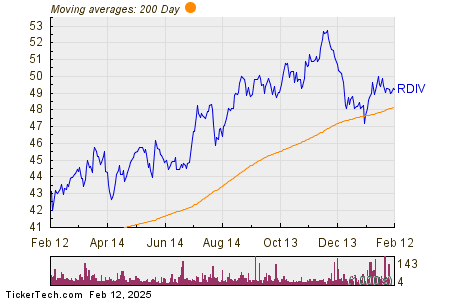Significant Outflows Mark Invesco S&P Ultra Dividend Revenue ETF
Weekly Changes Reveal $226.3 Million Drop in Shares Outstanding
Examining the week-to-week changes in ETF shares at ETF Channel, a notable trend has emerged for the Invesco S&P Ultra Dividend Revenue ETF (Symbol: RDIV). This fund has experienced an outflow of approximately $226.3 million, translating to a 21.9% decrease in shares outstanding, dropping from 20,970,000 to 16,380,000 in just one week. Among RDIV’s key holdings, CVS Health Corporation (Symbol: CVS) has risen by about 14.7%, while Prudential Financial Inc (Symbol: PRU) has dipped around 0.6%. Furthermore, Best Buy Inc (Symbol: BBY) has seen a decline of approximately 2.2%. For a detailed list of holdings, visit the RDIV Holdings page »
The chart below illustrates RDIV’s one-year price performance alongside its 200-day moving average:

According to the chart, RDIV’s lowest price in the past 52 weeks stands at $41.72 per share, reaching a peak at $53.02. The recent trading price is $49.27. Analyzing the latest share price against the 200-day moving average can be a valuable strategy for investors—learn more about the 200-day moving average »
Free Report: Top 8%+ Dividends (paid monthly)
Exchange Traded Funds (ETFs) function similarly to stocks, with investors buying and selling “units” instead of “shares.” These units can be traded like stocks and can also be created or destroyed based on market demand. Each week, we track the week-over-week changes in shares outstanding to identify ETFs with significant inflows (indicating new units created) or outflows (indicating old units destroyed). The creation of new units necessitates purchasing the underlying assets of the ETF, while destroying units involves selling those assets, which can influence the performance of the individual stocks within the ETF.
![]() Click here to discover which 9 other ETFs have experienced notable outflows »
Click here to discover which 9 other ETFs have experienced notable outflows »
Also see:
- Blue Chip Dividend Stocks Hedge Funds Are Buying
- OCEA Videos
- Top Ten Hedge Funds Holding OPRA
The views and opinions expressed herein are those of the author and do not necessarily reflect the opinions of Nasdaq, Inc.








